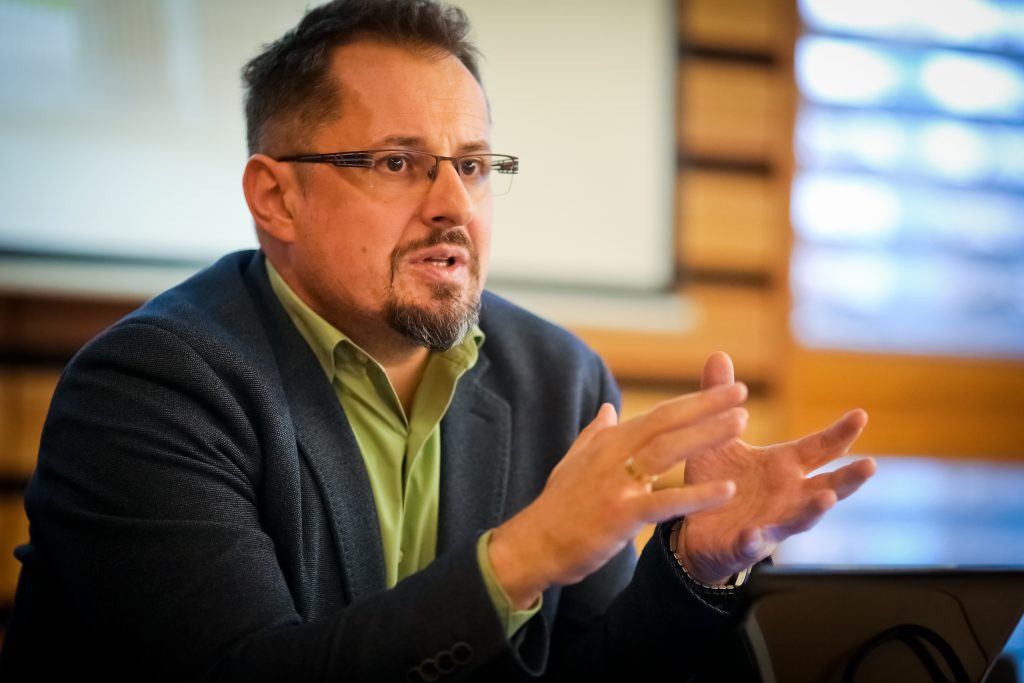University of Pécs – Visibility, attention, integration

Interview the head of the Centre for Internationalization and Connections (CIC) at the University of Pécs, Dr. István Tarrósy.
CIC well may be one of the largest newly established organizations within the cabinet of the new rectoral management. What is its purpose?
Indeed, this new unit serves as an umbrella for the former Foreign Affairs Directorate, the Marketing Department, UnivTV, UnivPécs and the Career Office. In accordance with the rationalizing and dynamizing expectations of the rectoral programme, we are striving to bring those units closer which have operated separately but all worked on making the university more visible. I expect dynamic and sped up work from the new centre, improving the visibility of the university both at the national and the international scene. When we are speaking of international and national enrolment, it is worth to think about how these surfaces meet in the fields of visibility, campaigns and communication. The same expectations are true in case of the university media: the aim is a dynamic, integrated editorial board serving the purpose of visibility. We are also planning to renew the image of the university, however, we must not hurry, and we will need to elaborate on it thoroughly.
We are only at the beginning of the process, and there are plans to call for tenders internally, expecting the participation of innovative cross-disciplinary student teams.

You have mentioned enrolment: the number of active international students has increased to 4,100, and there are even more in the rectoral programme. What are the tendencies and further trends?
A quarter of our international students taking part in full programmes are on grants. The Hungarian government opened up a new dimension in internationalizing higher education in our country by launching the Stipendium Hungaricum programme. Besides programmes that already had been international – such as medical and healthcare education – all the other fields could start to catch up, especially by developing bachelor and master programmes in foreign languages. It is a great opportunity for the University of Pécs: the Medical School had 60% of the total number of foreign students until 2015, while now this rate has decreased by 10%, while the total number of international students has nearly doubled. That is, it is not the numbers of the Medical School dropping but the other faculties catching up or improving their already existing programmes. The Medical school still remains the flagship of internationalization, the one with the most experience in international education. The other faculties can develop internationally attractive and luring programmes based on the increasing amount of experience. And while the number of students on grants has increased more significantly, the total increase is not owing only to them.
We can see that there is a demand for the international programmes offered by UP in the market as well.
By the way, similar grant programmes were implemented for developing areas, including Africa, in the ‘70s and ‘80s: a minority of those students chose to settle and start a family here, they were integrated, but most of them returned home because they wanted to contribute to the development of their own countries. By obtaining a competitive degree in Hungary, they had an advantage in the employment market, which also have brought on connections and relationships that are still active. It is an advantage for us as well when an international student studies in Hungary: it can bring commercial agreements and investments later. An alumni network has serious potentials as well.
The main concern around Stipendium is what will happen if the resources are cut back.
We can certainly see that the government has doubled the national budget of the Stipendium Hungaricum programme! We are also familiar with the development plans, which have been outlined to receiving institutions by Tempus Foundation, the organization co-ordinating the programme at a national level. On the basis of all these, we can say that the programme is stably functioning and offers an opportunity to improve our international portfolio in a way that attracts and/or keeps foreign students in our fee-paying trainings.
Parallel to this direction, we have reinforced our efforts aimed at international enrolment, since we are present at several educations fairs worldwide, and we are building up networks with the help of secondary school advisors.
We also need to invite the representatives of headhunting and recruiting companies so that they can see where the students recruited by them will study. We also have launched our Student Ambassador Programme, based on our international students already studying here. They represent UP in their respective countries during their studies and after completing them: they are the ones who can convey their experience in their own cultures and in their own languages in the best way, and convince their peers that it is worth to come to study at UP.
The development of new devices is important, too. That is why we have introduced the use of DreamApply, which is used by each faculty of the UP, moreover, Tempus Public Foundation channels the applications of every Stipendium student in this system. It is a user-friendly, transparent system dynamizing not only application but everyday contact and communication with students, making the work of the colleagues handling their administration much easier. I think it has been a big step forward.

We also need to improve our international prestige; the best way of which is to move up in rankings. The regional director of Times Higher Education visited Pécs in December, engaging in serious negotiations with the heads of the faculties and management concerning ranking. We also can see the areas where we need to improve, launch campaigns, promotions and do research.
Our student population represents well over 110 countries, and we find that the over 60 Stipendium counties that have entered in a bilateral agreement with the Hungarian government and for which the government provides quotas, can constitute target markets for recruiting fee-paying students as well.
The rectoral programme includes the objective of obtaining 5,000 more Hungarian students as well. How do you think this target can be met, what innovations could be applied to reach this target? Increasing the number of Hungarian students seems to be an even bigger challenge than that of foreign ones.
Yes, especially with demographic tendencies, a decreasing number of births and an aging population in view. The University of Pécs will be able to recruit significantly more Hungarian students – mainly from its primary enrolment area, the Transdanubian region – if the town of Pécs and the region can offer good opportunities for employment after the completion of their studies here. As long as the industrial-commercial presence is not more prevalent and a determining factor in the town and in the region, we cannot really depend on their force to keep students here. Youth pondering on higher education consider several factors from living costs to the competitiveness of actual degrees, but they take job-market opportunities into account for sure. It is not easy for us. I think the university makes a huge effort to improve on this situation; it is enough to mention the dual training in the field of engineering. What is up to UP is to offer specific and quality study programmes that cannot be found anywhere. I think the management of the university represents this demand quite definitely.
On this basis, we also have started to co-operate with secondary schools; not only in Hungary, but in the international scene as well.
What new services can foreign students expect? We already have the Stipendium Gala and the International Spring which are unique in the country. What would the next step be?
International Spring had a number of antecedents which I think we have managed to bring together and strengthen. This program allows us to introduce the town to the cultures of our students, but it is also about facilitating integration of Hungarian and international students and making them more open to mobility. There is an increasing demand for gaining experience in foreign countries, and it is an important factor in the enrolment process as well.
By the way, student teams have already started working on preparing the three-month series of programmes taking place between March and May.
Concerning the Stipendium Programme, certain services already have been launched which even go beyond expectations of the Tempus Public Foundation: legal aid, mental hygiene and intercultural training. When we see some examples of best practice at a certain faculty, we apply it elsewhere, even at university level. This was how we elevated the mentoring network of the Stipendium programme on an institutional level, involving all our international students. It also serves the aim of integration.
To what degree do the citizens of UP utilize their opportunities for mobility?
It is a nationwide problem, affecting Pécs as well, that the number of students travelling abroad within the framework of the Erasmus programme stagnates or even decreases. One of the reasons is that a lot of students do some work besides their studies and they want to complete their studies and find a job as soon as possible, obviously. But the experience that can be obtained during a semester of Erasmus studies or internship is priceless, and we should make them understand this. The mobility of administrative employees has also increased, and we have a stable mobile circle of lecturers which we wish to expand. Now that the focus of the Erasmus programme is not limited to Europe, virtually any country in the world has become available.
We also have a new programme developed by our own, which is unique in the whole country: the Travelling Ambassadors Programme.
We partially subsidize participation in professional conferences, while the travelling persons commit themselves to engage in or deepen a relationship with the actual institutions, or even organizes guest lectures for UP. Of course, these are agreed upon in advance. There is a huge interest; a hundred of our lecturers from all the faculties have utilized this opportunity during the last one and a half years; thus this programme have opened up a number of new opportunities for UP as an institution as well. I think my colleagues have done a great job!
Prepared by: Éva HARKA
Featured image and photos: Szabolcs CSORTOS and József HUBAY
Source: UnivPécs







